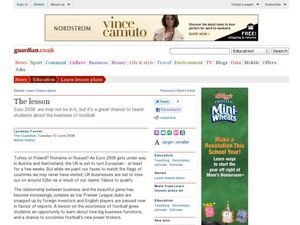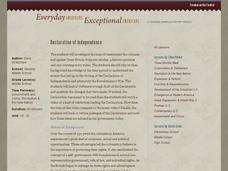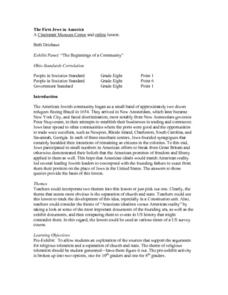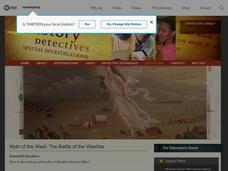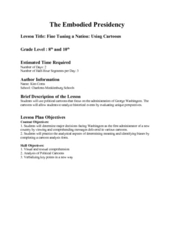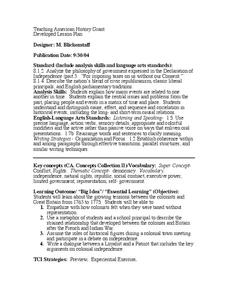National Endowment for the Humanities
How to Win a World War
High schoolers are have begun to learn the art of diplomacy with each other, but do they understand how diplomacy works at a global level? The second in a series of four lessons, guides scholars in evaluating primary sources. The why...
Curated OER
Taxation Without Representation
Eighth graders empathize with how colonists felt when they were taxed without representation. They use a metaphor of students and a school principal to describe the strained relationship that developed between the colonies and Britain.
Curated OER
Exploring the Declaration of Independence
Eighth graders describe the basic ideas of government and arguments supporting the separation of the colonies from Britain in the Declaration of Independence. They actively participate in class discussion and then review, answering all...
Curated OER
Moving Toward Independence
Eighth graders identify the reasons why colonists were fed up enough to want to break free of colonial rule and create their own government. They complete an in-dept analysis of the pamphlet Common Sense and it's role in fueling the...
Curated OER
Turning the Tide in Europe, 1942-1944
Learners identify the reasons why the U.S. government decided to focus on the defeat of Germany and Japan and assess the wisdom of this decision. They analyze the magnitude of the U-Boat threat in the Atlantic.
Curated OER
Blessings of a Free Government: The Louisiana Purchase in 1803
Learners may take part in a multitude of activities listed such as creating political cartoons, comparison papers, and creating a portfolio to reinforce concepts and ideas surrounding the Louisiana Purchase.
Curated OER
Win or Lose?
Students consider how the first supercasino in Britain will impact the nation. In this current events lesson plan, students visit the noted Web sites to gather information about the casino and the positive and negative effects of gambling.
Curated OER
Euro 2008
Students discover details about the world of British football. In this current events lesson, students browse selected websites to explore the work and history of the game, the Euro 2008, and the business aspects of the game in Britain.
Roy Rosenzweig Center for History and New Media
Declaration of Independence
Give budding historians a guided exploration of the Declaration of Independence, historic photos, videos, and more as they deepen their understanding of the American Revolution and the attitude of the colonists leading up to the war.
Curated OER
The Two Sides of the Declaration of Independence
Budding historians read six documents related to grievances that led to the writing of the Declaration of Independence. They then craft an essay in which they discuss the perspective of both the colonists and the king. This DBQ could be...
National Endowment for the Humanities
Lesson 2: The United States, France, and the Problem of Neutrality, 1796–1801
While the French Revolution could be considered inspired by the American Revolution, it created thorny problems for the new United States. Should the United States get involved and be drawn into a European drama? Was the US strong...
Curated OER
"Declaration of Independence" From Plagiarism
So, what does the Declaration of Independence even mean? Learners of all ages paraphrase the Declaration of Independence in modern terms. They work as a group or class to paraphrase the language of the Declaration of Independence. There...
Curated OER
The Design of Fort McHenry: The Star Fort
What makes an effective fort, and why might a city feel that they need such a structure? Your young historians will explore the purpose and design for Fort McHenry, and build their own models of a fort based on the information they have...
Roy Rosenzweig Center for History and New Media
Patriots or Traitors - Point of View in the War for Independence
Patriots or traitors? Class members analyze images that present widely differing views of the Boston Tea Party, identifying the point of view of the image, the propaganda devices used, and the intended audience.
Curated OER
The First Jews in America
Students investigate how Jews established roots in America. Students determine the difference between religious tolerance and separation of church and state. Students participate in a role-play activity using primary and secondary...
What So Proudly We Hail
Life, Liberty, and the Pursuit of Happiness: A Lesson on the Declaration of Independence
What does it mean to say that a right is unalienable? How did the founding fathers convey this revolutionary concept in the Declaration of Independence? Engage in a close reading and analysis of the Declaration of Independence, and...
PBS
Myth of the West: The Battle of the Washita
Go West, young man! Scholars use PBS video clips, slide shows, and interactive materials to create a picture of Manifest Destiny in the American West. Using a variety of primary and secondary sources, young historians learn about the...
North Carolina Consortium for Middle East Studies
Missing Pieces of the Puzzle: African Americans in Revolutionary Times
What's missing from most studies of the American Revolutionary War is information about the role African Americans played in the conflict. To correct this oversight, middle schoolers research groups like the Black Loyalists and Black...
Roy Rosenzweig Center for History and New Media
Founding Documents
Teach the class about the predecessor to Declaration of Independence—the Virginia Declaration of Rights. Using the foundational documents, scholars examine the two writings to consider how they are similar and how they are different. A...
Curated OER
Understanding American Values
Scholars read books and discuss emotions that lead up to the American Revolution. They also discuss vocabulary and use reference materials to research the Internet for causes and sentiment that led to the American Revolution.
Curated OER
Fine Tuning a Nation: Using Cartoons
Students examine political cartoons to gain an understanding of the political issues that George Washington faced. In this historical perspectives lesson, students analyze political cartoons about the National Bank, the title presidents,...
National Endowment for the Humanities
Magna Carta: Cornerstone of the U.S. Constitution
High schoolers use the Internet to read a brief description of Magna Carta (link provided). They "walk through" the document with the teacher, identifying four major themes. Students read and discuss "The Rhetoric of Rights: Americans...
Curated OER
Fourth Grade Social Studies
In this social studies worksheet, 4th graders complete multiple choice questions about the Constitution, natural resources, economics, and more. Students complete 25 multiple choice questions.
Curated OER
The Declaration of Independence
Students empathize with the colonists. In this activity on the Declaration of Independence, students collaborate to problem solve a school dilemma that enables them to understand the issues and difficulties that occurred in the creation...









